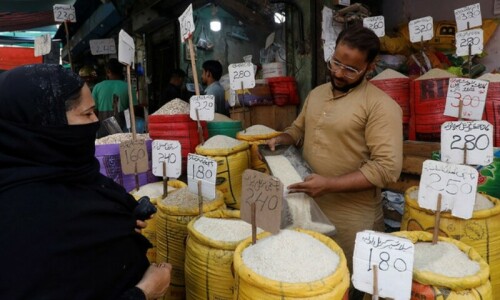• Petrol price likely to increase by Rs9/litre due to rupee depreciation, global price hike
• Finance ministry to review relief proposals over inflated bills due to IMF accord
ISLAMABAD: While the caretaker government struggles to find a solution to ‘electricity price shock’ against the backdrop of countrywide protests, a potential petroleum price shock looms over the horizon later this week, that may push all fuel products beyond Rs300 per litre.
This comes as the caretaker set up continues brainstorming sessions for the third straight day in a bid to find ways to provide relief to the protesting masses, but without any success.
The prices of both major petroleum products — petrol and high-speed diesel — are estimated to go up by about Rs9-10 per litre and Rs18-20 per litre, respectively, on August 31, while kerosene is slated to be costlier by about Rs13 per litre, based on existing tax rates and import parity price, mainly because of currency depreciation and slight increase in international oil prices.
Background discussions with relevant officials suggest that the government had no instrument available to provide any permanent relief in electricity prices to the people, except providing instalments for a couple of months or staggering recoveries of current two-month bills to winter months, when normal consumption drops by almost half. Both these options are revenue neutral, although they could create cash flow problems for power companies for a few months.
In fact, the government had already requested the power regulator to stagger charging another Rs5.40 per unit quarterly tariff adjustment over six winter months starting October instead of permissible in three months.
The major factor to the current price shock stems from currency depreciation, accounting for almost 70pc, and the government had no lever at its disposal at present to control, given the IMF programme. Another 10-12pc hike is because of interest rates and the government and the SBP’s hands are not only tied under the fund programme but under pressure to further tighten the monetary policy.
‘At cost of IMF programme’
The sources said these were precisely the proposals offered by the power division to the Prime Minister’s Office along with a few other suggestions that involve financial impact that could only be implemented at the cost of the IMF programme and hence not supported by the finance ministry. In fact, the Federal Board of Revenue is the direct beneficiary of the high energy cost given the fact that its 18pc take automatically goes up with price hike. The tax target of over Rs9.2 trillion is directly dependent on the high rate of inflation.
For example, these officials said, the power division had also indicated providing one-slab benefit to the residential consumers as used to be the case until last year but withdrawn under the IMF programme to arrest circular debt because of substantial financial impact.
Also, another suggestion pertained to lowering of sales tax rate or doing away with other taxes like income tax and surcharges but those too had been imposed under the overall scheme of the IMF programme to achieve a specific tax target and circular debt reduction plan in consultation with international lenders, including the World Bank and the Asian Development Bank.
Also, the tax rates and impositions are duly enforced by parliament through finance bills while surcharges were imposed by successive governments – the latest being Rs3.23 per unit that came into force only a few months ago in the run-up to the revival of the suspended IMF programme.
The only option left for the caretaker government is to suspend television and radio taxes but then these are inconsequential and hence not under consideration for any change.
It may also be kept in mind that the government is bound under the ongoing SBA (stand-by arrangement) to provide quarterly data on performance relating to recoveries and circular debt changes to the IMF in line with set targets no later than 30 days on completion of each quarter. Hence, the government cannot afford any slippage on the completion of the first quarter on September 30 which would come under direct review of the IMF staff by the end of October or early November for the disbursement of $710 million second tranche of the $3bn SBA.
Mainly because of these challenges, it was agreed on Monday at the PM’s Office that proposals regarding the one-slab benefit and relief in taxes should be referred to the finance ministry before a formal discussion is taken at the meeting of the federal cabinet anticipated on Tuesday. But the officials made it clear that no formal proposal for tariff reduction was on the table at the moment.
Published in Dawn, August 29th, 2023














































Dear visitor, the comments section is undergoing an overhaul and will return soon.